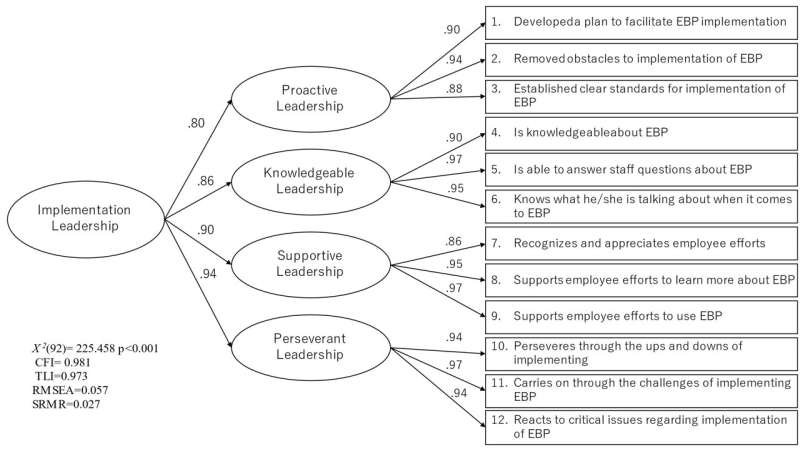This article has been reviewed according to Science X's editorial process and policies. Editors have highlighted the following attributes while ensuring the content's credibility:
fact-checked
trusted source
proofread
Testing implementation leadership scale for quality care delivery in Japan

In nursing, evidence-based practice (EBP) entails providing holistic, high-quality care based on the most recent research and information rather than traditional methods or personal beliefs. EBP is viewed as the gold standard for delivering the highest standards in clinical practice and patient outcomes.
Yet, there are several hurdles to EBP implementation. It is difficult for staff nurses to tackle the implementation of EBP on their own as they lack managerial skills. Nurse managers, on the other hand, can influence how team members cooperate to adopt EBP as well as the attributes of the workplace. As a result, strategic leadership in the workplace by nurse managers is a vital facet of EBP implementation.
The implementation leadership scale (ILS) assesses strategic leadership shown by managers in EBP implementation. It was originally developed by Aarons et al. (University of California, San Diego) to implement EBPs in clinical settings and to develop successful intervention programs. However, the individual characteristics of managers that contribute to their ILS scores are not fully understood across the globe.
To help better integrate findings from research studies into clinical practice, Professor Ikuko Sakai and a team of researchers recently developed and validated a Japanese version of the ILS.
The team is comprised of Masatoshi Saiki from Chiba University, Ai Tomotaki from Tokai University, Hiroki Fukahori from Keio University, Takeshi Yamamoto from Sapporo Medical University, Masakazu Nishigaki from International University of Health and Welfare, Chiyo Matsuoka from Konan Women's University, and Emi Yasuda from the National Institute of Public Health.
Their findings were published in the Journal of Nursing Management.
Prof. Sakai says, "The ILS has been translated into other languages like Chinese, Greek, and Norwegian, and this Japanese version will enable more international comparative studies."
The ILS is available in two versions: one for self-assessment of managers and another for staff assessments. To create a Japanese version, the original ILS was translated into Japanese and was then given to the clinical nurses for review and to confirm if it was valid. Next, the Japanese ILS was distributed as a web questionnaire to 119 nurse managers and 2,858 staff nurses working in Japan to gather data on the strategic leadership demonstrated in EBP implementation.
The confirmatory factor analysis (CFA) was used to determine its construct validity or whether the Japanese version measures implementation leadership with the original construct. The CFA analysis helped the researchers understand how proactive leadership, knowledgeable leadership, supportive leadership, and perseverant leadership contributed to the strategic leadership of nurse managers.
For nurse managers, the validity of ILS was determined by comparing the scores based on their educational background (high school/vocational school/junior college/graduation) and experience in implementing EBP. The results showed that both versions of the Japanese ILS could satisfactorily gauge the strategic leadership of nurse managers and were reliable.
"We found that nurse managers with more advanced education and experience with learning and working on EBP had higher ILS scores," Prof. Sakai confirms.
The team is optimistic that the translated ILS will advance the development of educational programs designed to help implement EBP and help test their effectiveness. Prof. Sakai explains, "Research on EBP and its implementation is progressing slowly in Japan, but I'm confident the translated ILS will have a positive impact. It will expedite the transition from delivering patient care based on habitual practice to care that is the product of evidence gained from primary research."
More information: Masatoshi Saiki et al, Reliability and Validity of the Japanese Version of the Implementation Leadership Scale for Nurse Managers and Staff Nurses: A Cross-Sectional Study, Journal of Nursing Management (2023). DOI: 10.1155/2023/4080434




















